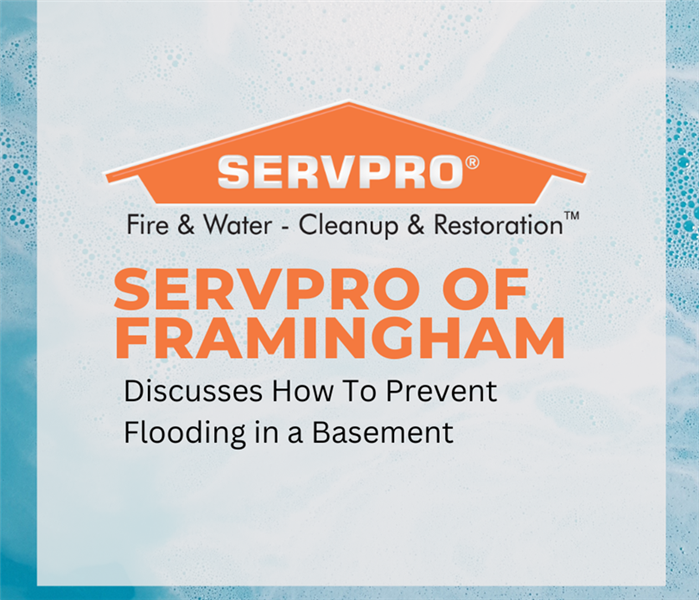SERVPRO of Framingham Discusses How To Prevent Flooding in a Basement
2/5/2023 (Permalink)
 If your basement is flooded, it's important to take immediate action to prevent further damage and to mitigate any health risks
If your basement is flooded, it's important to take immediate action to prevent further damage and to mitigate any health risks
Flooding in a basement can be a stressful and devastating experience. It can cause extensive damage to your property and belongings, and if not addressed promptly, it can also lead to mold growth, which can pose serious health risks. In this blog post, we will discuss the causes of basement flooding, the steps you can take to prevent it, and what to do if your basement is flooded.
There are many reasons why a basement can flood. Some common causes include:
- Heavy rainfall: When there is an excessive amount of rainfall in a short period of time, it can cause water to seep into the basement through cracks in the foundation, windows, or doorways.
- Overflowing gutters and downspouts: If your gutters and downspouts are clogged, water will overflow and can seep into the basement.
- Sewer backup: A sewer backup occurs when wastewater from the sewer system enters your basement. This can be caused by a blockage in the sewer line, heavy rainfall, or a malfunction in the sewage system.
- High water table: If the water table is high in your area, it can cause water to seep into the basement through the walls or floor.
To prevent basement flooding, there are several steps you can take:
- Install a sump pump: A sump pump is a device that pumps water out of the basement when it reaches a certain level.
- Check your gutters and downspouts regularly: Make sure they are clear of debris and are directing water away from the foundation of your home.
- Install backflow valves: Backflow valves prevent sewer water from flowing back into your home.
- Seal cracks in the foundation: If you find cracks in the foundation of your home, have them sealed to prevent water from seeping in.
If your basement is flooded, it's important to take immediate action to prevent further damage and to mitigate any health risks:
- Turn off the electricity: If water has entered your basement, turn off the electricity to prevent electrical shock.
- Remove water: If the water level is not too high, use a pump or wet vacuum to remove the water. If the water level is too high, call a professional to remove the water.
- Clean and dry everything: Once the water has been removed, clean and dry all the items in the basement. This includes walls, floors, furniture, and other belongings.
- Call in professionals: If the damage is extensive, it's best to call in a professional to assess the damage and make any necessary repairs.
Basement flooding can be a stressful and devastating experience, but by taking the steps to prevent it and knowing what to do if it occurs, you can minimize the damage and health risks associated with it. If you do experience basement flooding, don't hesitate to call in a professional to help with the cleanup and repair process.
SERVPRO of Framingham is your premier choice for fire damage and restoration. Our teams are ready to respond 24 hours a week, any day of the year. When you bring us on the job our team of licensed contractors and certified technicians will work collaboratively with you throughout the duration of the project. They will keep you updated on the project's status and ensure that your expectations are met. We will help you to move forward and make it “Like it never even happened” for all of your fire damage.





 24/7 Emergency Service
24/7 Emergency Service